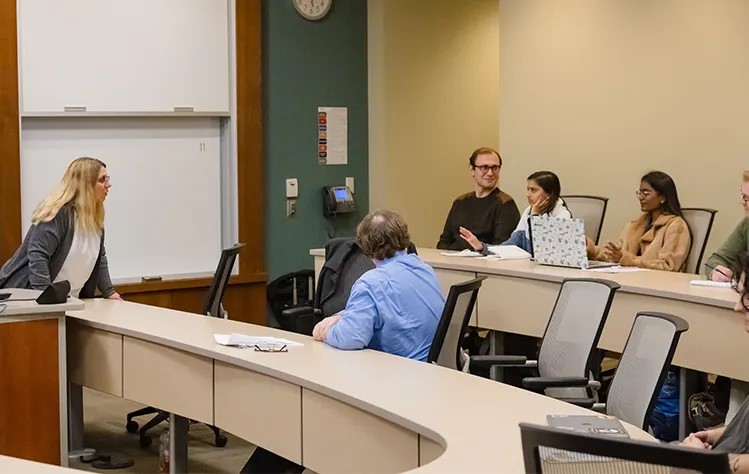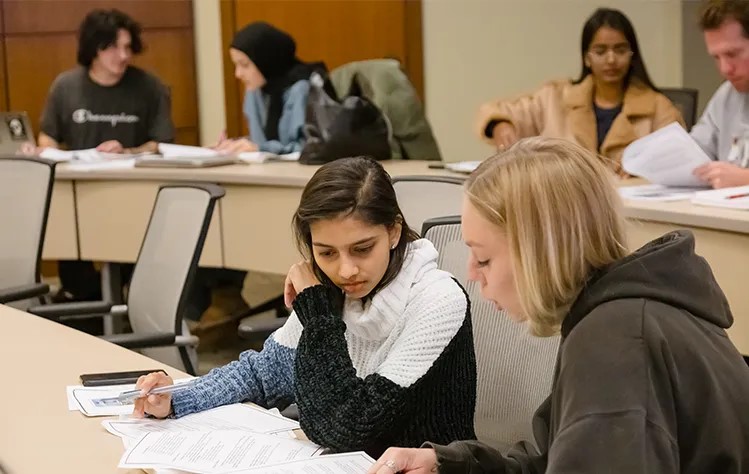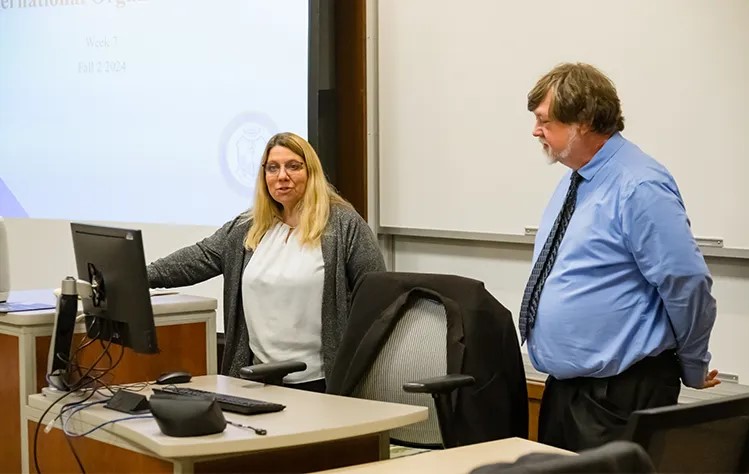Breaking New Pedagogical Ground: Belo, Jensen and Serfass Lead Professional Negotiation Workshop
December 16, 2024
By Dani Belo, Gina Jensen, Tom Serfass

In a groundbreaking initiative, Professor Gina Jensen, director of Forensics, and Professor Tom Serfass, assistant director of Forensics, who lead Webster’s award-winning Debate Team, delivered a professional negotiation and argumentation workshop to students in Dani Belo, PhD’s International Organizations class.
The workshop, a first of its kind, aims to equip students with essential negotiation skills for the contemporary job market, particularly in the fields of foreign and public policy.
“This workshop is a game-changer for students preparing to navigate complex professional environments,” said Belo, assistant professor of Security and International Relations and director of the Global Policy Horizons Lab. “Negotiation is at the heart of diplomacy and public policy, and we wanted to provide students with a hands-on experience that mirrors real-world challenges.”
The session, held on Dec. 4, commenced with an interactive seminar introducing foundational concepts of negotiation and argumentation. Students actively engaged with theories and techniques, guided by Jensen and Serfass, both of whom are seasoned professionals in negotiation and conflict resolution.
“We emphasized the importance of understanding interests versus positions,” Jensen explained. “In negotiation, it’s not just about winning an argument but finding a solution that satisfies all parties involved.”
After the seminar, students were divided into groups to apply the concepts through practical exercises. These exercises served as preparation for an upcoming simulation in which participants will represent various ethnic groups and international stakeholders, striving to resolve a complex political crisis. The simulation, designed as the course’s final assignment, aims to deepen students’ understanding of the dynamics of international negotiations.

Serfass highlighted the importance of practice in mastering negotiation skills. “Theoretical knowledge is crucial, but it’s the application in high-pressure scenarios that prepares students for the real world,” he said. “This workshop bridges that gap.”
Students expressed enthusiasm about the workshop and its relevance to their career aspirations. Many noted that the practical exercises helped bridge the gap between theoretical concepts and real-world applications. The skills gained from this experience are expected to provide a significant advantage in future professional and academic endeavors.
The initiative aligns with Belo’s vision of integrating experiential learning into the curriculum to enhance students’ readiness for professional challenges. “Our goal is to produce graduates who are not only well-versed in theory but also skilled practitioners capable of making an impact in their fields,” he remarked.

The success of the workshop has already sparked discussions about its future iterations and potential integration into the borader curriculum. As Belo noted, “Workshops like this provide students with a competitive edge. It’s an investment in their professional future.”
With initiatives like these, Webster University continues to set the standard for innovative and practical education in international relations and policy studies.
For more information about the International Organizations course, as well as the Global Policy Horizons Lab, please contact Dani Belo; for inquiries about the Webster Debate Team, please contact Gina Jensen or Tom Serfass.
